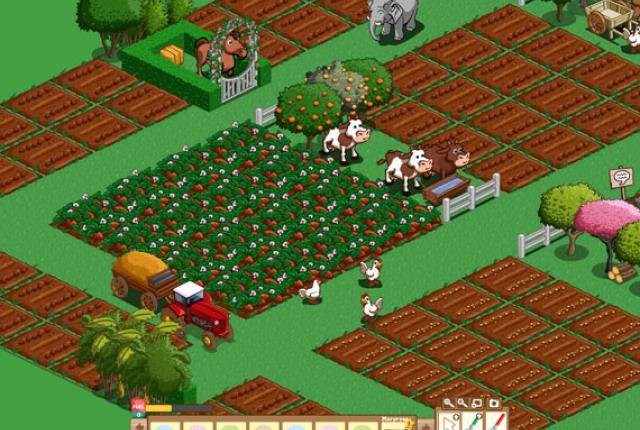I’m not one of them. I work in the fields for a living. After a long day of toiling on a real farm, running a virtual one isn’t high on my list of leisure-time priorities. But it’s okay if others do. I’m actually encouraged by FarmVille’s popularity. It’s a healthy sign for agriculture–but only if players don’t come to think that running a farm is as easy as FarmVille makes it seem.
The concept behind FarmVille is simple: You plant seeds, grow crops, and make money. These activities earn experience points, which allow your operation to expand.
The key to the game’s popularity lies in its social-networking features. Friends on Facebook can become neighbors in the virtual world of FarmVille. By helping with various tasks, such as fertilizing fields, neighbors can give each other a boost.
Success at FarmVille requires foresight, persistence, and a willingness to help others–just like farming in the real world.
The game includes plenty of whimsical elements. Ugly ducklings turn into beautiful swans. Pink cows make strawberry milk. A field of crops can grow to maturity in just a few hours.
That’s not how things work on my farm, of course. If FarmVille was as difficult and complicated as actual farming, probably no one would play it. A realistic depiction of farm life would require a simulation of what it’s like to lie on the ground in six-degree weather to fix a harvester whose chain was knocked loose by a clump of frozen corn stalks.
This was something I had to do just a few weeks ago, during an abnormally late harvest. It wasn’t a pleasant chore, but it was part of the day’s work. When it was done, there was no strawberry milk waiting for me at home on the kitchen counter, virtual or otherwise.
I don’t want to give the impression that I don’t like my job. I love to farm. But the work is hard. It has its moments of real frustration and discomfort.
The challenges of running a successful farming operation are enormous. Success depends upon adaptation. We have to respond to all sorts of factors that are beyond our control. The weather may help or hinder. Pests can be anything from minor irritants to major forces of destruction. The financial markets, the price of energy, and the intrusiveness of government regulations also have a significant impact on what we do.
There’s no such thing as a typical year. Sometimes the lessons from one season will apply to the next, but nothing is ever exactly the same. You have to change to meet the conditions of the time.
For this reason, farmers need every advantage they can get. Free-trade agreements with other countries allow us to export our products to foreign consumers. Biotechnology allows us to plant seeds that can withstand attacks from insects and weeds. In the near future, it will help us combat other challenges, such as drought. Our prosperity in the years ahead will depend upon new trade talks and emerging technologies.
FarmVille doesn’t even begin to address these complexities. That’s okay. It’s a game–and it’s supposed to be fun.
And it may even have real value. We live in a time when agriculture is so efficient that the vast majority of people in the developed world are cut off entirely from food production. Many have never set foot on a farm, let alone had to worry about raising and protecting crops. They have very little understanding of how food travels from farm to fork.
FarmVille won’t fill in all of these gaps in knowledge. Yet it may serve as a useful reminder that food doesn’t just come from the grocery store. It comes from the dedication of men and women around the world who work the land.
John Reifsteck, a corn and soybean farmer in western Champaign County Illinois, is a Board Member of Truth About Trade and Technology (www.truthabouttrade.org).

